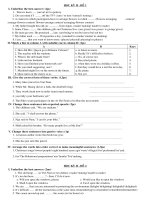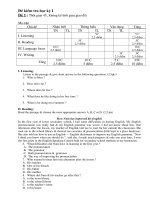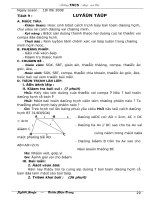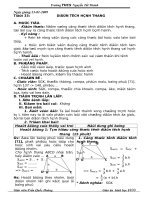8. E7.U8.I-Lsw7.Hs_Nqt.doc
Bạn đang xem bản rút gọn của tài liệu. Xem và tải ngay bản đầy đủ của tài liệu tại đây (342.55 KB, 10 trang )
UNIT 8: FESTIVALS AROUND THE WORLD
Tài liệu chính chủ từ FB Quang Nguyễn & Zalo NQT 0339981186
A. VOCABULARY
Lesson 1
No
Words
1
annual
2
attraction
3
bonfire
4
Class
(adj)
Transcription
Meaning
/ˈænjuəl/
hàng năm
/əˈtrækʃən/
điểm thu hút du khách, điểm hấp
dẫn
(n)
/ˈbɑnˌfaɪər/
lửa mừng, lửa trại
competition
(n)
/ˌkɑmpəˈtɪʃən/
cuộc thi
5
fight
(n)
/faɪt/
cuộc đấu
6
hot-air balloon
(n)
/hɑt-ɛr bəˈlun/
khinh khí cầu
7
lantern
(n)
/ˈlỉntərn/
lồng đèn
8
participant
(n)
/pɑrˈtɪsəpənt/
người tham gia
9
race
/reɪs/
cuộc đua
10
sculpture
/ˈskʌlpʧər/
tác phẩm điêu khắc
(n)
(adj)
(n)
Lesson 2
No
Words
Class
Transcription
Meaning
11
celebrate
(v)
/ˈsɛləˌbreɪt/
kỷ niệm
12
decorate
(v)
/ˈdɛkəˌreɪt/
trang trí, trang hồng
13
exchange
(v)
/ɪksˈʧeɪnʤ/
trao đổi
14
greeting
(n)
/ˈgritɪŋ/
lời chào hỏi, lời chào mừng
15
midnight
(n)
/ˈmɪdˌnaɪt/
nửa đêm
16
pudding
(n)
/ˈpʊdɪŋ/
bánh pút-đinh
17
temple
(n)
/ˈtɛmpəl/
đền, chùa, miếu
18
tradition
(n)
/trəˈdɪʃən/
truyền thống
19
wish
(v)
/wɪʃ/
ước
1
Lesson 3
No
Words
Class
Transcription
Meaning
20
defeat
(v)
/dɪˈfit/
đánh bại
21
demon
(n)
/ˈdimən/
quỷ, yêu ma
22
mud
(v)
/mʌd/
bùn, sình lầy
23
muddy
/ˈmʌdi/
đầy bùn, lầy lội
24
race
(v)
/reɪs/
(chạy) đua
25
wrestling
(n)
/ˈrɛslɪŋ/
mơn đấu vật
(adj)
B. GRAMMAR
I. Future simple (Thì tương lai đơn)
❶. Usage (Cách dùng)
Cách dùng
Dùng để diễn tả một
hành động hay sự việc
sẽ xảy ra trong tương
lai
Ví dụ
- The festival will take place from February 1st to 10th.
(Lễ hội sẽ diễn ra từ ngày mùng 1 đến ngày 10 tháng 2.)
- Our band will play at the festival next month.
(Ban nhạc của chúng tôi sẽ chơi tại lễ hội này tháng tới.)
- I think she will come and join our festival next week.
Dùng để diễn tả một sự (Tôi nghĩ cô ấy sẽ đến và tham gia lễ hội của chúng ta vào tuần tới.)
dự đoán
- I think Ms Jenny will teach at this school next year.
(Tôi nghĩ cô Jenny sẽ dạy ở ngôi trường này năm tới.)
- Will we join the firework festival at Van Lang Park tonight?
Dùng để diễn tả một
lời đề nghĩ, gợi ý
(Tối nay chúng ta sẽ tham gia lễ hội pháo hoa ở công viên Văn Lang nhé?)
- What will we do now?
(Chúng ta sẽ làm gì bây giờ nhỉ?)
- I promise I will come here tomorrow.
Dùng để diễn tả một
lời hứa
(Tôi hứa tôi sẽ đến đây vào ngày mai.)
- He promises he will take me to that festival next spring.
(Anh ấy hứa anh ấy sẽ đưa tơi đến lễ hội đó và mùa xn tới.)
❷. Form (Dạng thức của thì tương lai đơn)
2
Thể khẳng định
Thể phủ định
I/ You/ We/ They/
I/ You/ We/ They/
Danh từ số nhiều
+ will + V nguyên mẫu
Danh từ số nhiều
He/ She/ It/
(will = ’ll)
+ will not + V nguyên
mẫu
He/ She/ It/
(will not = won’t)
Danh từ số ít
Danh từ số ít
Ví dụ:
Ví dụ:
- I will visit Hue city.
- She won’t forget him.
(Tôi sẽ đến thăm thành phố Huế.)
(Cô ấy sẽ không quên anh ấy.)
- She will be fourteen years old on her next birthday.
- Hung will not go camping next week.
(Cô ấy sẽ 14 tuổi vào sinh nhật kế tiếp.)
(Tuần tới Hùng sẽ không đi cắm trại.)
- They will come to the party next Sunday. (Chủ nhật
tuần sau họ sẽ đến bữa tiệc.)
- We won’t do some shopping tomorrow.
Thể nghi vấn
Câu trả lời ngắn
I/ You/ We/ They/
Wil
l
Danh từ số nhiều
He/ She/ It/
Yes,
+ V
mẫu?
(Ngày mai chúng tôi sẽ không đi mua sắm.)
nguyên
Danh từ số ít
No,
I/ You/ We/ They/
Danh từ số nhiều
He/ She/ It/
Danh từ số ít
will.
won’t.
Ví dụ:
- Will you go to Hanoi city next month? Yes, I will./ No, I won’t.
(Tháng sau bạn sẽ đi thành phố Hà Nội à?)
- Will she meet her boyfriend tonight? (Tối nay cô ấy sẽ gặp bạn trai phải không?)
Yes, she will./ No, she won’t.
- Will they arrive here next week? (Tuần sau họ sẽ đến đây phải không?)
Yes, they will./ No, they won’t.
Dấu hiệu nhận biết
- Trong câu thì tương lai đơn thường xuất hiện các từ sau: tonight (tối nay); tomorrow (ngày mai);
next week/ month/ year....(tuần/ tháng/ năm sau), some day (một ngày nào đó); soon (chẳng bao lâu),...
- Ngoài ra các từ và cụm từ như I think, I promise, perhaps = probably (có lẽ, có thể),... cũng được
dùng trong thì tương lai đơn.
II. The structure using “like” and “different from”
3
1. The comparison with “like”: Chúng ta dùng cấu trúc so sánh “like” để so sánh sự giống và khác
nhau giữa các sự vật, sự việc.
SSSS + V + O (nếu có) + like + noun/ pronoun
- Mr. Quang speaks English like a native speaker.
- We won’t join this festival like American.
2. The comparison with “different from”: Chúng ta dùng cấu trúc so sánh “different from” để so
sánh sự giống và khác nhau giữa các sự vật, sự việc.
SSS + be + different from + noun/ pronoun
- This festival is different from that one.
- Your choice is different from mine.
C. PRACTICE
Lesson 1
I. Look at the words in the box and write the suitable word for each picture. (Vocabulary 1)
lantern
eating competition
bonfire
sculpture
water fight
1.
2.
3.
4.
5.
6.
7.
II. Fill in the blanks with words or phrases from exercise I. (Vocabulary 1)
4
race
hot-air-balloon
Description
Word
The art of making three-dimensional representative or abstract forms,
especially by carving stone or wood or by casting metal or plaster.
a competition between runners, horses, vehicles, boats, etc., to see which is
the fastest in covering a set course.
It is a type of using various water-dispensing devices to soak opponents.
Everything from buckets to balloons to water guns and even cupped hands
cradling water can be applied in it.
An aircraft consisting of a very large bag filled with heated air or other gas,
with a basket hanging under it in which people can ride.
A large open-air fire used as part of a celebration, for burning trash, or as a
signal.
A small portable lamp in which light is provided by electric batteries or by a f
uel such as kerosene, especially one that has a transparent case to enclose and
protect the light.
An activity in which participants compete against each other to eat large
quantities of food, usually in a short time period.
III. Fill in the blanks with the correct form of the words in brackets. (Grammar 1)
1. The Huong Pagoda Festival (begin)__________ on January 27th.
2. There (be)__________ many activities at the Hung King Temple festival this year.
3. Which band (play)__________ at the festival next year?
4. The beer drinking competition (take place)__________ in Germany next Sepemter.
5. The horse race (open)__________ for the public for the first time this year.
6. (there/ be)__________ any firework festivals for people in Thanh Thuy district this new year?
7. I think she (win)__________ the eating competition next year.
8. Who (perform)__________ the last song at the festival tomorrow night?
9. Peter (join/ not)__________ to play the match next week.
10. Mr. Thi (write)__________ a new book of the Traditional Elephant Procession Festival.
Lesson 2
I. Look at the words in the box and write the suitable word for each picture. (Vocabulary 2)
5
exchange
tradition
midnight
wish
greeting
celebrate
1.
2.
3.
4.
5.
6.
.II. Fill in the blanks using the words in the box from exercise I.
1. Some Asian countries, such as Vietnam and South Korea_______________ Lunnar New Year.
2. She wanted to stay up until_______________ to see the fireworks last night.
3. I will send my friend a card and_______________ her a happy birthday.
4. Many parts in Vietnam share the_______________ of having a big family meal on Christmas Day.
5. The boss welcomed us with a warm_______________ and introduced us to the staff.
6. Minh and I often_______________ English grammar books with each other at school.
III. Fill in the blanks with “like” or “different”. (Grammar 2)
1. My sister is__________ from me. I like traveling but she doesn’t.
2. She smiles__________ her father.
3. South Korea celebrates Lunnar New Year__________ Vietnam.
4. Thai New year is__________ from Vietnamese New Year.
5. My new car runs well__________ Japanese car.
6. In Italy, they eat seafood at Christmas. That’s__________ from Japan.
7. __________ Amerian children, French children go egg hunting on Easter Sunday.
8. The lucky color in Spain is__________ from that in Argentina.
9. __________ Chinese people, Vietnamese people give children lucky money on Lunar New Year.
10. The festival this year isn’t__________ that last year. There are more outdoor activities.
Lesson 3
TEST FOR UNIT 8
6
I. Choose the words whose underlined part is pronounced differently from that of the others in each
group.
1. A. annual
B. attraction
C. lantern
D. race
2. A. bonfire
B. fight
C. competition
D. midnight
3. A. greeting
B. generous
C. great
D. growing
4. A. suggestion
B. location
C. celebration
D. option
5. A. around
B. sound
C. about
D. tour
6. A. seafood
B. balloon
C. good
D. moon
7. A. happens
B. lights
C. festivals
D. teams
8. A. sculptures
B. experiences
C. exchanges
D. places
9. A. introduced
B. welcomed
C. performed
D. believed
10. A. crowded
B. celebrated
C. defeated
D. prayed
II. Choose the word whose main stressed syllable is placed differently from that of the other in each
group.
11. A. lantern
B. midnight
C. temple
D. defeat
12. A. muddy
B. pudding
C. event
D. bonfire
13. A. balloon
B. wooden
C. compare
D. exchange
14. A. remember
B. different
C. annual
D. festival
15. A. competition
B. participant
C. preparation
D. introduction
III. Choose the best answer to complete each sentence.
16. Hung King Temple Festival is a/ an__________ one in Phu Tho province. It is celebrated in lunnar
March every year.
A. monthly
B. weekly
C. annual
D. daily
17. On the day of the Fire Dancing Festival, the Pà Thẻn ethnic group in Hà Giang set a
big__________ on the yard and start the rituals.
A. bonfire
B. firework
C. flame
D. light
18. Tet holiday is coming around, so next Monday, each student in my class will bring a gift and
then__________ it with another student.
A. give
B. hand
C. exchange
D. send
19. During Tết holiday, Vietnamese people give each other best__________ for a lucky and successful
Lunar New Year.
A. traditions
B. sayings
C. wishes
D. greetings
20. We are going to visit our grandparents this weekend. They__________ very happy.
A. won't
B. will be
C. will
D. won't be
21. __________ in Chinese culture, red is a symbol of luck in most Vietnamese celebrations.
A. Similar
B. Different
C. Like
D. Same
22. My daughter usually stays up until midnight to see the__________ with the family members on
New Year's Eve.
7
A. tradition
B. fireworks
C. festival
D. wish
23. Uniforms in my school are different__________ those in my sister’s.
A. for
B. with
C. on
D. from
24. During Hội An Lantern Festival, visitors can__________ in many interesting activities and watch
various art performances, all of which are completely free of charge.
A. takes off
B. takes on
C. take place
D. take part
25. The U.S. always celebrates the Fourth of July with an amazing__________ display in the sky.
A. lightning
B. fire
C. fireworks
D. bonfires
IV. Supply the correct forms of the given words to complete the sentences.
26. The Thames Festival is an annual__________ of the River Thames in London with many exciting
events and talks.
(celebrate)
27. Last year on May Day, we wore our__________ costumes and danced around the Maypole.
(color)
28. Bon Om Touk is one of the most amazing__________ festivals in Cambodia.
(tradition)
29. During the Chiang Mai Flower Festival,__________ of the parade often hand out flowers to the
spectators along the street.
(participate)
30. Last year, I participated in one of the Scottish dancing ___________. I didn’t win, but I enjoyed
myself a lot.
(compete)
V. Choose the word which best fits each gap.
Last spring, I visited my cousin living in Ho Chi Minh City. She suggested the best time to visit
the city was during the Tet (31)__________. I had such a great time, so I want to share my personal
(32)__________ and what I learned about the Vietnam Lunar New Year.
First, Tet is a (33)__________ of the start of spring. The city is full of flower vendors, and all
the trees are in bloom. Second, it’s about paying respect to your ancestors. I saw many people burning
incense and families putting out food and fruit for their loved ones who have passed away. Finally, Tet
(34)__________ about spending time with your family. I was surprised at how empty the city was. My
cousin told me it's a (35)__________ for families to return to their hometown to celebrate the New
Year.
31. A. celebrate
B. festival
C. enjoyment
D. tradition
32. A. performance
B. competition
C. experience
D. interest
33. A. celebration
B. tradition
C. program
D. festival
34. A. won’t be
B. will be
C. can be
D. is
35. A. experience
B. tradition
C. competition
D. holiday
VI. Read the following passage. For each question, write T if the statement is TRUE, F if the
statement is FALSE, and NI if there is NO INFORMATION on it.
8
The largest festival in the world is Brazil’s Carnival which is considered by many to be “the
greatest show on Earth.” More than 5 million people travel to Brazil in February or March to attend
this religious celebration that begins 40 days before Easter. The festival is full of live music and people
dancing in the streets. More than 70+ samba schools compete every year for cash and prizes. Dancers
from these schools wear colorful and creative costumes. They form a long line of people in the street
called a parade that starts in the city center and stops at the ocean. The festival takes place before the
Catholic season of Lent and celebrates the last day before Brazilians must give up the things they love
for 40 days. The festival ends with a beautiful fire show on the beach when the sun goes down.
Statements
True
False
Not
given
36. The festival begins with a beautiful fire show on the beach.
37. The Carnival is a large festival in Brazil.
38. The festival takes place after the Catholic season of Lent.
39. Dancers from local samba schools wear costumes and compete for cash
and prizes.
40. You can find lots of great food at the festival.
VII. Rewrite the following sentences without changing the meaning.
41. People will hold Mid-Autumn Festival on the fifteenth of lunnar August.
(celebrate)
→ People will__________________________________________________________________
42. Both Chinese and Vietnamese people give children lucky money on Lunar New Year.
→ Like Vietnamese people, _______________________________________________________
43. This festival happens in some countries in Southeast Asia.
(takes)
→ This festival _________________________________________________________________
44. Life in The countryside is quiet and peaceful. Life in the city is exciting.
(different)
→ Life in The countryside________________________________________________________
45. Vietnamese people visit temples on New Year’s Day and Japanese also visit temples on that day.
→ Like ________________________________________________________________________
VIII. Put the words in the correct order to make correct sentences.
46. This musical festival/ like/ not/ the last year’s./ is
9
_______________________________________________________________________________
47. My brother’s/ is/ taste/ sports/ different/ mine./ from/ in
_______________________________________________________________________________
48. You/ come/ should/ us/ join/ and/ the Laughing Festival./ at/
_______________________________________________________________________________
49. Mid-Autumn Festival/ often/ celebrated/ on/ is/ the 15 th day/ of the 8th lunnar month/ with a full
moon at night.
_______________________________________________________________________________
50. During the festival,/ of all age/ wear/ colorful masks,/ carry/ children/ candle lanterns/ and/ on the
streets./ parade/
_______________________________________________________________________________
10









